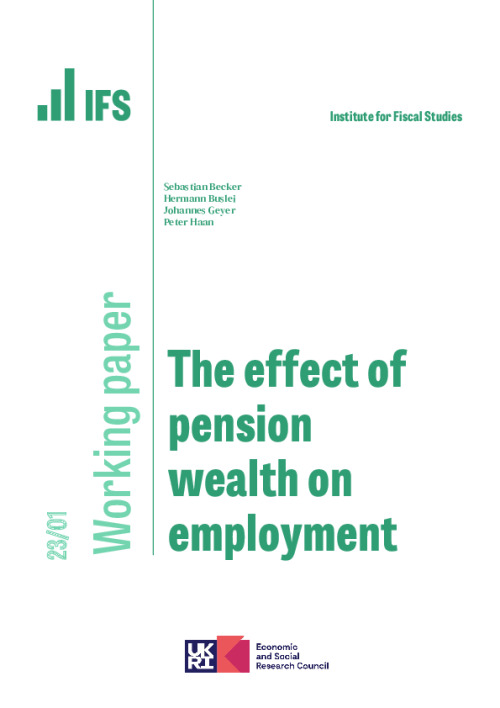Downloads

WP202301-The-effect-of-pension-wealth-on-employment.pdf
PDF | 3.13 MB
This study provides novel evidence about the pension wealth elasticity of employment. For the identification we exploit reform-induced variation of pension wealth that is related to the number of children but which does not affect the implicit tax rate of employment. We use a difference-in-differences estimator based on administrative data from the German pension insurance and find that, on average, the negative employment effect of pension wealth is significant and economically important. Heterogeneity analyses document a strong age pattern showing that the employment effects are driven by behavioral responses of women close to retirement. The age pattern is partly explained by the positive effect of pension wealth on disability pensions after the age of 60.
Authors

Research Fellow DIW Berlin
Head of department of Public Economics at DIW Berlin and Professor of Public Economics at Freie Universität Berlin.
Working Paper details
- DOI
- 10.1920/wp.ifs.2023.0123
- Publisher
- Institute for Fiscal Studies
Suggested citation
Becker, S et al. (2023). The effect of pension wealth on employment. 23/01. London: Institute for Fiscal Studies. Available at: https://ifs.org.uk/publications/effect-pension-wealth-employment (accessed: 30 June 2024).
More from IFS
Understand this issue

If you can’t see it, you can’t be it: role models influence female junior doctors’ choice of medical specialty
24 April 2024

Raising revenue from closing inheritance tax loopholes
18 April 2024

Why inheritance tax should be reformed
18 January 2024
Policy analysis

How do the last five years measure up on levelling up?
19 June 2024

Pensions: five key decisions for the next government
7 June 2024

Key decisions await the pensions minister after the election
7 June 2024
Academic research

The impact of labour demand shocks when occupational labour supplies are heterogeneous
28 June 2024

The intergenerational elasticity of earnings: Exploring the mechanisms
3 June 2024

Labour market inequality and the changing life cycle profile of male and female wages
15 April 2024